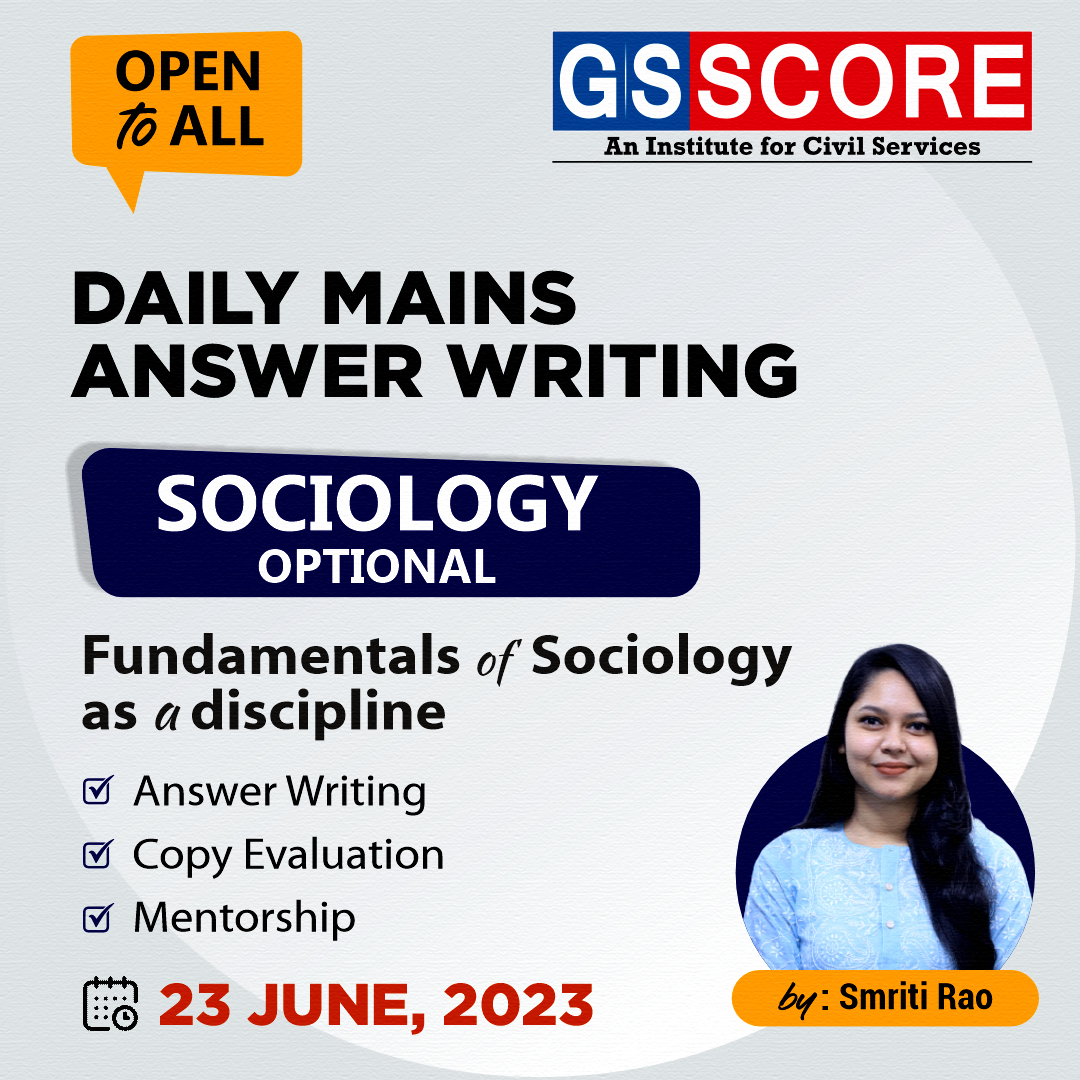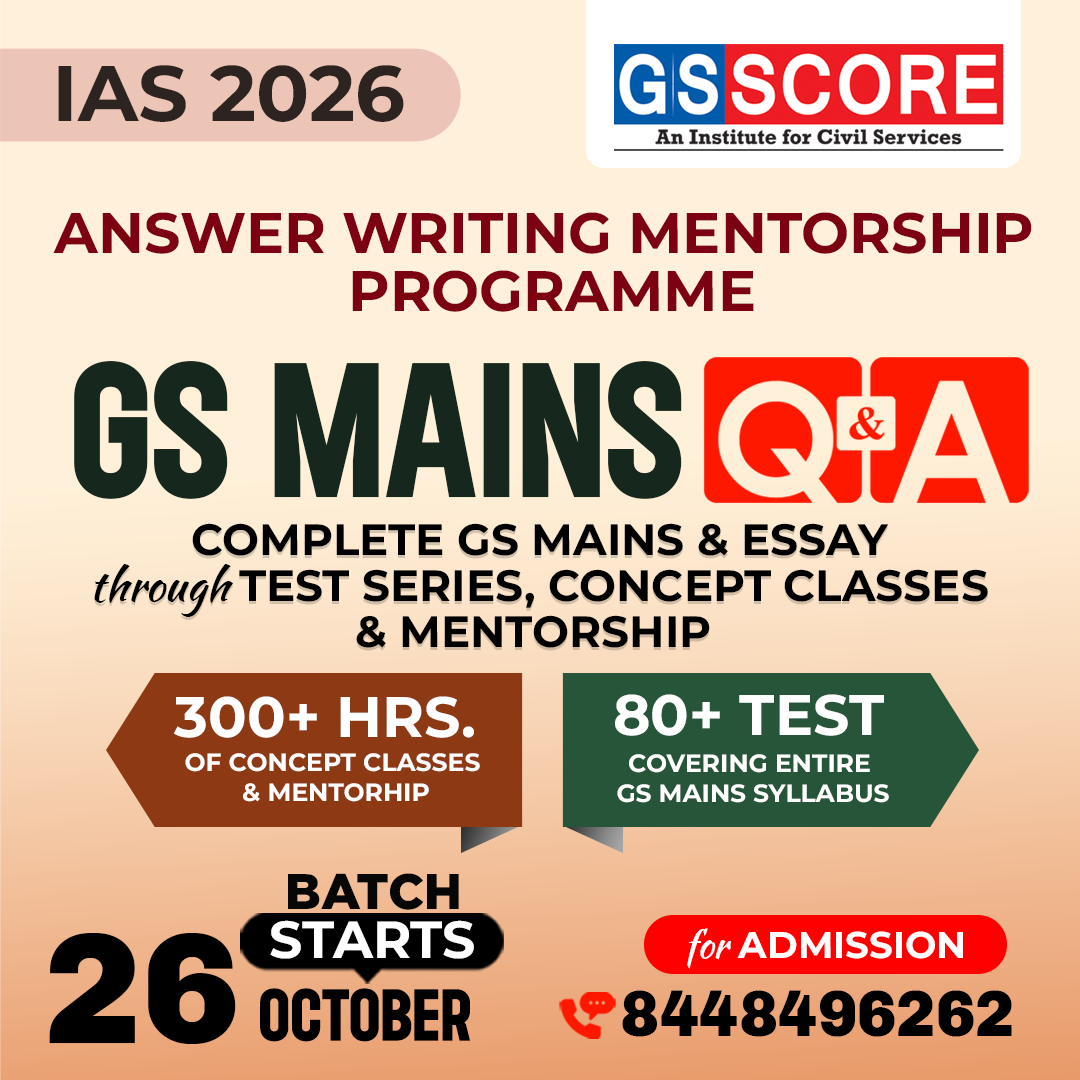


Instruction:
- There will be 2 questions carrying 10 marks each. Write your answers in 150 words
- Any page left blank in the answer-book must be crossed out clearly.
- Evaluated Copy will be re-uploaded on the same thread after 2 days of uploading the copy.
- Discussion of the question and one to one answer improvement session of evaluated copies will be conducted through Google Meet with concerned faculty. You will be informed via mail or SMS for the discussion.
Question #1. Sociological thought precedes the emergence of Sociology as a discipline. Critically examine.
Question #2. The focal point of Sociology rests on interaction. How do you distinguish it from common sense?
(Examiner will pay special attention to the candidate's grasp of his/her material, its relevance to the subject chosen, and to his/ her ability to think constructively and to present his/her ideas concisely, logically and effectively).
STEPS & INSTRUCTIONS for uploading the answers
Step 1 - The Question for the day is provided below these instructions. It will be available at 7:00 AM.
Step 2 - Uploading of Answers : Write the answer in A4 Sheet leaving proper margins for comments and feedback and upload the PDF in MY ACCOUNT section. Click on the option of SUBMIT COPY to upload the PDF.
Step 3 - Deadline for Uploading Answers: The students shall upload their answers by 7:00 PM in the evening same day. The first 50 copies will be evaluated.
Step 4 - Feedback : Mentors will give their feedback for the answers uploaded. For more personalised feedback, join our telegram channel by clicking on the link https://t.me/mains_answer_writing_cse . A one-to-one session will be conducted with the faculty after copy evaluation in 72 Hrs.
Model Answer
Question #1. Sociological thought precedes the emergence of Sociology as a discipline. Critically examine.
Approach:
- The answer must contain early thinkers, sociological theories, factors that went into the development of Sociology.— Political philosophy: Plato, Aristotle; Economic thought: Adam Smith, Kautilya; Philosophy: Hegel and Feurbach
- Thinkers contributed in the emergence of Sociology need a mention such as Comte Rousseau, Montesquie, Voltaire, Charles Darwin and Herbert Spencer
- Factors contributed in the emergence of the discipline: Enlightenment, Renaissance, Modernity,
- Brief note on work by August Comte, Karl Marx, Emile Durkheim as founding fathers
- Can conclude with the wide ranging scope of sociology with emergence of multi-theoretical approach, Post Modernism, Post Structuralism, Neo Marxism, Neo Feminism.
Hints:
It is a truism that that the history of social life and its problems is as old as human being itself and for thousands of years, society has been a subject for speculation and enquiry. As a testimony, one could trace the roots of sociological understanding even in ancient Greek and Roman literatures such as Republic of Plato and Ethics of Aristotle also St.Augustine’s De civitate Dei that deals with social concepts and questions.
Sociological Thought to Sociology:
Early disciplines such as History, Economics, Political Science, and Philosophy attempted a study of various problems related to society. To have a glance from the few:
Deliberations made in Political Philosophy:
Thomas Hobbes and Machiavelli were the outstanding contributors of the realistic approach to social problems. Hobbes in his Levithan and Machiavelli in his Prince, analyses the system of statecraft and also put forward conditions for success of State and society.
Deliberations made in economics:
Adam Smith’s “Wealth of Nations” and Kautilya’s Arthashastra were not only talked about economics but gave a detailed account of problems related to society and administration at length.
Emergence of Sociology as a distinct discipline:
Various strains and tendencies, some intellectual and some social, combined to-form the science of sociology. To quote Bottom ore, “The conditions which gave rise to sociology were both intellectual and social”.
Intellectual thought for sociology:
Enlightening thoughts of Montesquieu and Rousseau on liberty, equality, and emphasis upon reason and individualism had a great influence on the emergence for the nascent discipline, to begin with. In the same manner luminaries like Adam smith, Ricardo and James Mill talked of a new economic order all these had a common thread i.e. rationality of human thoughts. Hence, new order started to replace the old order. In this background emerged the earliest Sociological thoughts in the minds of likes of Hegel, Comte and Spencer.
They made a bid to understand the cause of these new events and their cosequences for society.
It was Auguste Comte who called the new set of thoughts as Sociology for the first time and he believed that study of Sociology would be scientific. He developed his scientific view of the discipline in the form of Positivisim. Spencer followed the footsteps of Comte and gave the idea of Social evolution similar to biological evolution. Another early Sociological thinker was Durkheim who made valuable contributions to sociological theory and method. The Rules of Sociological Method, one of the Durkheim’s principal work is specifically concerned with methodological problems.
Another prominent thinker was Karl Marx who introduced an entirely new attitude and orientation in the study of society that has made significant contribution to the development of sociology, for it has compelled thinkers to give their attention on social (including economic) relationships than the social thought.
Further, sociology was enriched by the contribution of Max Weber. The development of sociological theory was advanced by Weber’s use of the comparative method, for he contributed more to comparative sociology than almost any other scholar. Weber gave a new start with his work on important subjects such as bureaucracy, sociology of law and religion.
Social reasons for the emergence of Sociology:
Ideological reawakening like Renaissance and Moderninty prepared the ground for sociological thinking in public domain. The arrival of Industrial and French Revolution proved to be pivotal for the emergence of Sociological understanding of society, in other words Sociology because Industrial Revolution led to the emergence of middle class and dismantling of feudal estates and French Revolution challenged the monarchical order and affected all the spheres of life.
Today, Sociology has grown more interdisciplinary than ever, widening its scope in a never before manner. In the recent years multi-theoretical approaches have come up like:
Postmodernism, Poststructuralism, Neo Marxism, Neofeminism among others.
Question #2. The focal point of Sociology rests on interaction. How do you distinguish it from common sense?
Approach:
- The Question asks you to distinguish between Sociology and common sense
- Firstly discuss the overlap between the two as common sense is the routine knowledge about the everyday world and the subject matter of sociology revolves around study of social interaction.
- Then discuss how the two are different from one another.
- Conclude accordingly.
Hints:
Sociological Imagination, a concept established by C. Wright Mills provides a framework for understanding our social world that far surpasses any common sense notion we might derive from our limited social experiences. Many people believe they understand the world and the events taking place within it, even though they have not actually engaged in a systematic attempt to understanding the social world, as sociologists do. Therefore, Peter Berger says:—
“The fascination of Sociology lies in the fact that its perspective makes us see, in a new light, the very world in which we have lived our lives”.
Common sense is the routine knowledge that people have of their everyday world. It helps them navigate their activities and shapes their interactions. Sociology is therefore accused of being nothing more than common sense because the common sense knowledge suffices for their interactions.
But Sociology and common sense differ on following grounds:
- Common sense is based upon assumptions, sociology is based on evidences. Sociological knowledge is based upon thorough research and the resulting outcomes may be contrary to the common sense.
- Common sense takes cues from what appears on surface whereas sociology looks for interconnections and root causes which may not be apparent. According to Peter Berger, ‘The fascination of Sociology lies in the fact that it makes us see in a new light, the very world in which we have lived our lives’
- Sociology uses reason and logic in its explanations, common sense uses conjectures and stereotypical beliefs. Common sense views are based upon stereotypes and are further reinforced through tradition. Sociology challenges these stereotypes and traditions. eg The subjugation of women is explained by common sense through biological factors, ritual sense. Sociology on the other hand explains it with concepts like Patriarchy.
- Common is status-quoist while sociology is change oriented.
- Sociological knowledge results into generalization and even theory building. Common sense knowledge on the other hand may be very personal and two persons may draw different conclusion of a same event based on their own common sense
- Empirical testing has no place in common sense knowledge, while sociological research may have Empirical orientation.
- Common sense is unreflective since it does not question its own origin, while sociological knowledge is subjected to unending debates and discourse.
However, there are a few similarities and complementarities between the two also. Firstly, concepts in sociology are framed by taking into consideration the commonsensical knowledge. Common sense helps sociologists in hypothesis building. Secondly, commonsense provides raw material for sociological investigations. Sociology tends to answer questions generated from common sense knowledge. For example, common sense views on gender are widely studied in sociology. Common sense also helps sociology by challenging its conclusions and thereby enriching the discipline. According to Anthony Giddens, sociological knowledge also itself becomes part of common sense knowledge sometimes. For example – sociological research into marital breakdown has led people to believe that marriage is a risky proposition.
When discipline moved closer to positivism, common sense was almost discarded. Anti-positivist on the other hand again tried to give importance to common sense. So, relationship between the two is dynamic and even mutually reinforcing at times.


